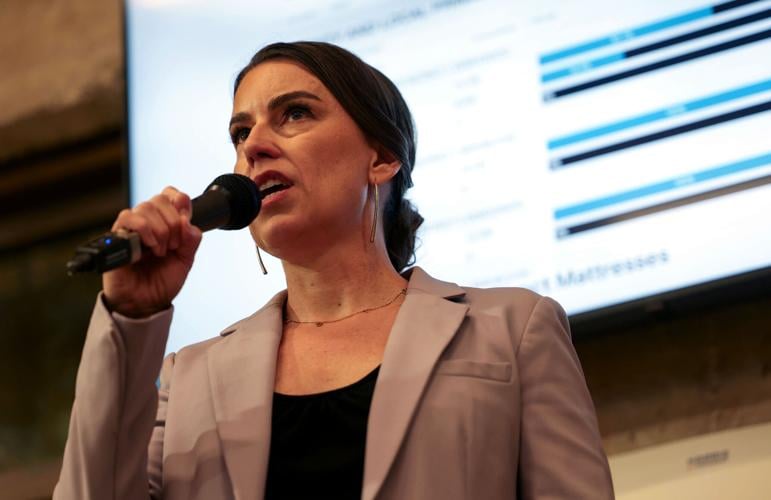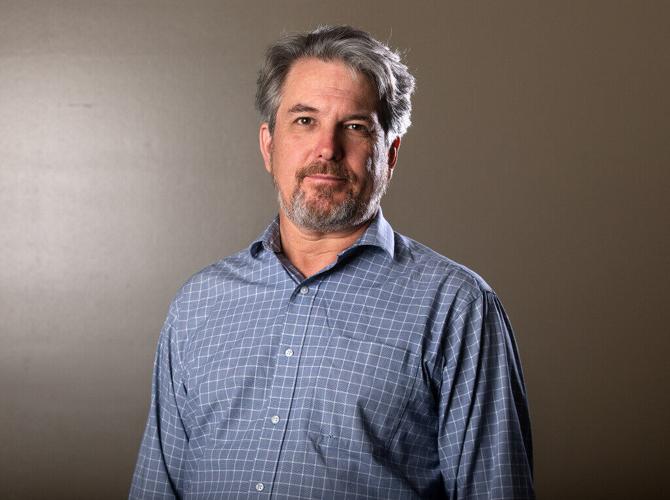These fights happen behind closed doors regularly and are usually resolved quietly.
Then, last month, a battle between Pima County prosecutors and federal prosecutors over a murder case exploded from behind office doors.
Pima County Attorney Laura Conover lambasted the U.S. Attorney’s Office for commandeering a Tucson murder defendant, preventing access to him and prioritizing their own, narrower criminal case.

����Ӱ��AV columnist Tim Steller
“He was taken early morning in the dark of night by federal agents from the hospital to a detention center in Florence Arizona,” Conover said in a press conference. “It’s not how these things work, ever.”
She explained to me in an interview Friday: “For days and days, we were negotiating quietly, diplomatically, professionally, to work out a way to not interfere with what we think is the heart of the matter, the first-degree murder, and justice for all seven-plus victims. Then once they took him out of the hospital in the middle of the night and out of county, that’s when I decided that the community should know what was happening.”
People are also reading…
The conflict over defendant Julio Cesar Aguirre reflects the political and cultural dividing lines of our time, as well as particular local conditions.
Aguirre is undocumented. Conover is opposed to the death penalty. The federal government is for it. And the local police have been turning to federal prosecutors for help putting criminals away.
The terrifying episode began before 6:30 a.m. on June 30, when police received a report that a man was acting erratically, and violently, breaking into a house and holding people at gunpoint. Over a period of almost three hours, Aguirre, 42, is accused of committing a dozen state crimes by breaking into homes, pointing a gun at residents of two houses and killing Ricky Miller Sr., 69, during a carjacking.
It took a team of SWAT and canine officers to find him in a shed and subdue him at 9:17 a.m., police said.
As it stands, the federal government is pursuing a narrower, five-count indictment against Aguirre while Conover explores how to pursue the broader, 12-count case, including a first-degree murder charge and aggravated assault charges for holding a multi-generational family at gunpoint.
“Possession is 9/10 of the law. When we lose custody to the feds, it can be incredibly hard to get the person back and proceed,” she said.
Politically attractive case
In 2020, I spoke with Sam Nunberg, one of Donald Trump’s early political advisers, about why Trump started talking about criminals illegally in the country as a core tenet of his 2015-16 campaign. The point was to contrast him from political opponents who viewed even undocumented foreigners as a net positive.
“All we hear is people saying, ‘These are good people. They’re here for a good life. They want to do jobs others don’t do,’” Nunberg told me. “And we wanted to say, ‘Oh, yeah? What about the other ones?’”
“What about this murderer? What about this rapist? What about this drug dealer?”
It’s been a winning formula for Trump, all the way through the 2024 campaign. So, of course, Aguirre represents a politically attractive target for federal agencies. They’re pursuing undocumented people of all sorts these days, including many with no criminal records, but especially those who have committed crimes.

Pima County Attorney Laura Conover
On July 30, the U.S. Attorney’s Office won an indictment against Aguirre on five charges, including attempted carjacking resulting in death and use of a firearm in a crime of violence causing death. The only victim in the indictment is Miller, not the others allegedly victimized.
“Both of these crimes are death-penalty eligible,” interim U.S. Attorney Timothy Courchaine noted in , the former Twitter. “It is our intent with this case to achieve justice for the victim and his family.”
In a press release, the office said, “The federal prosecution of this case is part of Operation Take Back America, a nationwide initiative that marshals the full resources of the Department of Justice to repel the invasion of illegal immigration, achieve the total elimination of cartels and transnational criminal organizations (TCOs), and protect our communities from the perpetrators of violent crime.”
At the press conference, Conover said, “This kind of disruption of justice was never advertised as part of their immigration policy.”
‘A broader, systemic failure’
There was blowback to Conover’s response.
“This case is not only heartbreaking, it’s a reflection of a broader, systemic failure in how repeat violent offenders are addressed in our community,” the Tucson Police Officers Association, the biggest union representing Tucson officers, said in a written statement.
“To be clear, we are not assigning blame to the Pima County Attorney’s Office for this specific act,” it went on. “But it’s impossible to ignore the pattern: cases falling apart, charges reduced, and repeat offenders walking free.”
Aguirre did have a previous conviction in Arizona, along with deportations, but the conviction was from Maricopa County.
In any case, this has been a growing complaint of some local law enforcement officers, crime victims and their advocates: Between Conover’s administration, which came into office on a criminal-justice-reform platform, and judges’ decisions, they say too many perpetrators get light sentences or are set free and re-offend.
In fact, the Tucson Police Department has been taking local prohibited-gun-possession cases to the U.S. Attorney’s Office to ensure defendants get stronger sentences. Conover noted that her office still takes many more prohibited possessor cases than are taken to federal prosecutors, though.
“We did 572 prohibited-possessor cases last year,” she said.
Those federal gun cases are also an outgrowth of the Justice Department’s Public Safety Partnership program, which came to Pima County in 2022. Local police and prosecutors meet with federal prosecutors regularly to discuss how to handle shootings and other crimes.
“We have these standing meetings where we discuss violent crime on a routine basis,” Tucson Police Chief Chad Kasmar said in an interview. There, they decide, “Which organization, which prosecutorial entity, is going to take the TPD case.”
Family objects to decision
Just last week, a Pima County Attorney’s Office prosecutorial decision raised outrage among victims.
The family of Paul Clifford, who was killed near Redington on Christmas Eve last year, has objected strenuously to plea agreements made with two of the three defendants. Jack Upchurch, 40, Elmer Smith, 19, and Wendy Scott, 16, were accused of luring Clifford from his home with a request for help, then killing him.
Smith pleaded guilty Tuesday to theft of means of transportation, a class three felony, and third-degree burglary, a class four felony. Scott pleaded guilty to two class-six felonies: tampering with physical evidence and unlawful use of means of transportation. The Pima County Attorney’s Office is proceeding to a first-degree murder trial for Upchurch and a possible natural-life sentence.
Smith faces a possible three to 11 years in prison while Scott faces a sentence between probation and four years in prison, said Christina Clifford, Paul’s widow. Clifford and her daughter, Sabrina Vining, have strenuously and publicly protested the plea agreements and asked for the Arizona Attorney General’s Office to take over the case.
“This case deserves a prosecutor who is willing to pursue justice, not someone who is afraid to use the tools provided by law,” Vining said in an Aug. 7 letter to Conover. “We need a prosecutor who will act without bias, personal agenda or political platform.”
Conover defended her office’s handling of the case, noting that her homicide panel had met and agreed to this path forward. She also said her office is moving faster than in the past to complete homicide cases, which lifts a burden on victims.
“We are steadfastly making our way to a first-degree murder trial,” she said. “As we know, it (the killing) was Christmas Eve, and we’ve told the court that we’re ready for a September trial.”
Lengthier federal prosecution
In the Aguirre case, the federal prosecution is likely to take much longer if they pursue the death penalty.
When I asked him about the case, John Leonardo, a former U.S. Attorney for Arizona and Pima County Superior Court judge, told me any defense attorney will work hard to remove the death penalty, possibly as part of a plea agreement.
Beyond that, “Trying to get the death penalty takes a long time because of all the appellate steps, and it’s very expensive.”
In the meantime, the state case is likely to languish, which is a shame because it means the actual murder charge and those involving all other victims will be on hold.
But that is the result of a fact of life: As much as we’d like these decisions to be neutral, prosecutors’ policies and politics naturally enter their processes. And the most powerful entity may be able to impose its will.












